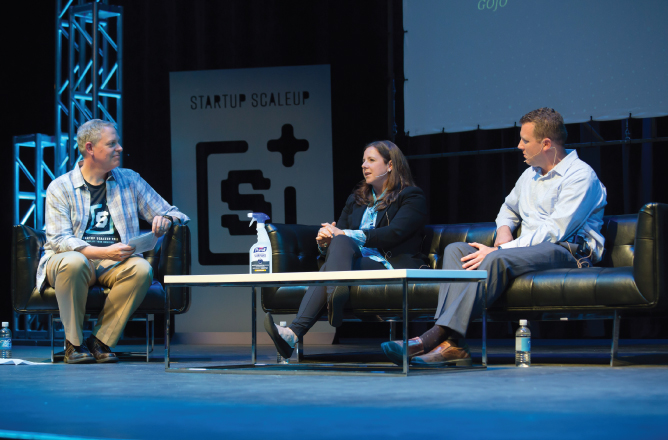Hyland And GOJO Reflect On How A Culture Of Entrepreneurship And Innovation Helps Them Thrive And Sustain Growth

Agility, spontaneity and creativity tend to be part and parcel of the culture at startup companies. That was certainly true for Hyland Software, according A.J. Hyland, whose brother John Patrick “Packy” Hyland Jr., founded the company in 1991.
“There would be some big customer support problem and Miguel (former CTO Miguel Zubizarreta) and I are in there beating our heads to try to figure it out,” Hyland told a packed crowd Aug. 15 at JumpStart Inc.’s Startup Scaleup event in the Gordon Square Arts District. “Then, we’d look out on the Rocky River and (Packy) had taken all of tech support out on a boat to lunch. That was the kind of fun stuff Packy did. But once you get to 70 people, you can’t do the boat trip anymore.”
A.J. Hyland was the Westlake firm’s sixth employee and served as CEO from 2001 until his retirement in 2013. During this 12-year period, revenue skyrocketed from $20 million to more than $200 million. He joined Carey Jaros, chief strategy officer of Akron-based GOJO Industries, at Startup Scaleup 2017 for a panel discussion about what it takes to innovate and grow.
During the session, titled “The Business of Getting Big,” Hyland and Jaros both reflected on the importance of institutionalizing the positive culture previous leaders put in place, especially in the face of growth and change.
Hyland recounted how he created a “minister of culture” position as a new CEO — a job that consisted of making sure employees were being taken care of the right way and focusing on fun activities that were now possible due to the company’s growth, such as chartered bus trips to concerts. He told the audience that another key part of maintaining the company’s great culture was being careful about the new executives they brought on board, especially after the company “got burned” a few times hiring people who had impressive resumes, but were not a good cultural fit.
“We learned quickly to get our HR hiring process around, ‘How do we find the right people with the right attitudes?’” he said.
According to Jaros, innovation and reinvention are two key components of the GOJO way of working. When faced with any tough challenge, always asking the question, “How might we,” has allowed GOJO to successfully maintain consistent double-digit growth over its 70-year history.
“We refer to it as constructive discontent,” she said. “Everybody at GOJO tends to look critically at what we are doing, and we don’t often celebrate right out of the bag. It’s more like, ‘What can we do to make this better for our customers?’ And, is there a way we can turn that into some great opportunity for our business?’”
GOJO Industries was founded in 1946 by Goldie and Jerry Lippman, whose first product was a heavy-duty waterless hand cleaner. Goldie Lippman — like many women during World War II — worked on the manufacturing floor of an Akron rubber company. To remove the graphite, carbon and tar on their hands, Goldie and other women had to use harsh chemicals, like benzene. Jerry Lippman, who completed only 10th grade but loved to tinker and experiment, set out to find a better solution. Walking the halls of Kent State University, Jerry found chemistry professor Clarence Cook who consulted on the invention of the first heavy-duty, waterless hand cleaner. Jerry mixed the new hand cleaner in his mother-in-law’s basement washing machine and sold it out of the back of his car.
Decades of asking, “How might we?” fueled continuing innovation and growth at GOJO, including development of the first portion-controlled dispensing system and the first push-bar soap dispenser – both precursors to the modern soap dispensers you see in every public restroom today. In 1988, PURELL Instant Hand Sanitizer was invented, born out of the insight that food service workers needed a convenient way to sanitize their hands away from the sink. Adoption into health care came next, where health care professionals needed an effective solution to clean their hands up to 100 times a day, without the drying and irritation that can come from frequent washing with soap and water.
“Fast forward almost 30 years, and the innovations keep on coming,” said Jaros. “We launched PURELL Surface Spray – our first surface product ever – last year. It kills 22 germs in 30 seconds and is safe to use around kids, pets and food. This fall, we are expanding the PURELL brand to Soap, launching a breakthrough new formulation that removes more germs than regular soap, without an antibacterial or conventional preservative. And we’re launching breakthrough new PURELL branded dispensers for all of our products that are literally changing the face of soap and hand sanitizer.”
Jaros makes it clear that this kind of sustained innovation couldn’t happen without a very special, very intentional culture. “The stars in our culture — the people we call out and celebrate — are the people who come with ideas and are on those ideas like a dog on a bone until something happens,” she said. “GOJO team members know that they are expected to fight for the insights and ideas they believe in. That’s how the company started. That’s how PURELL Hand Sanitizer was invented.”
“It’s culture — 100 percent,” she added.
This story originally appeared on Crain’s Cleveland Business.